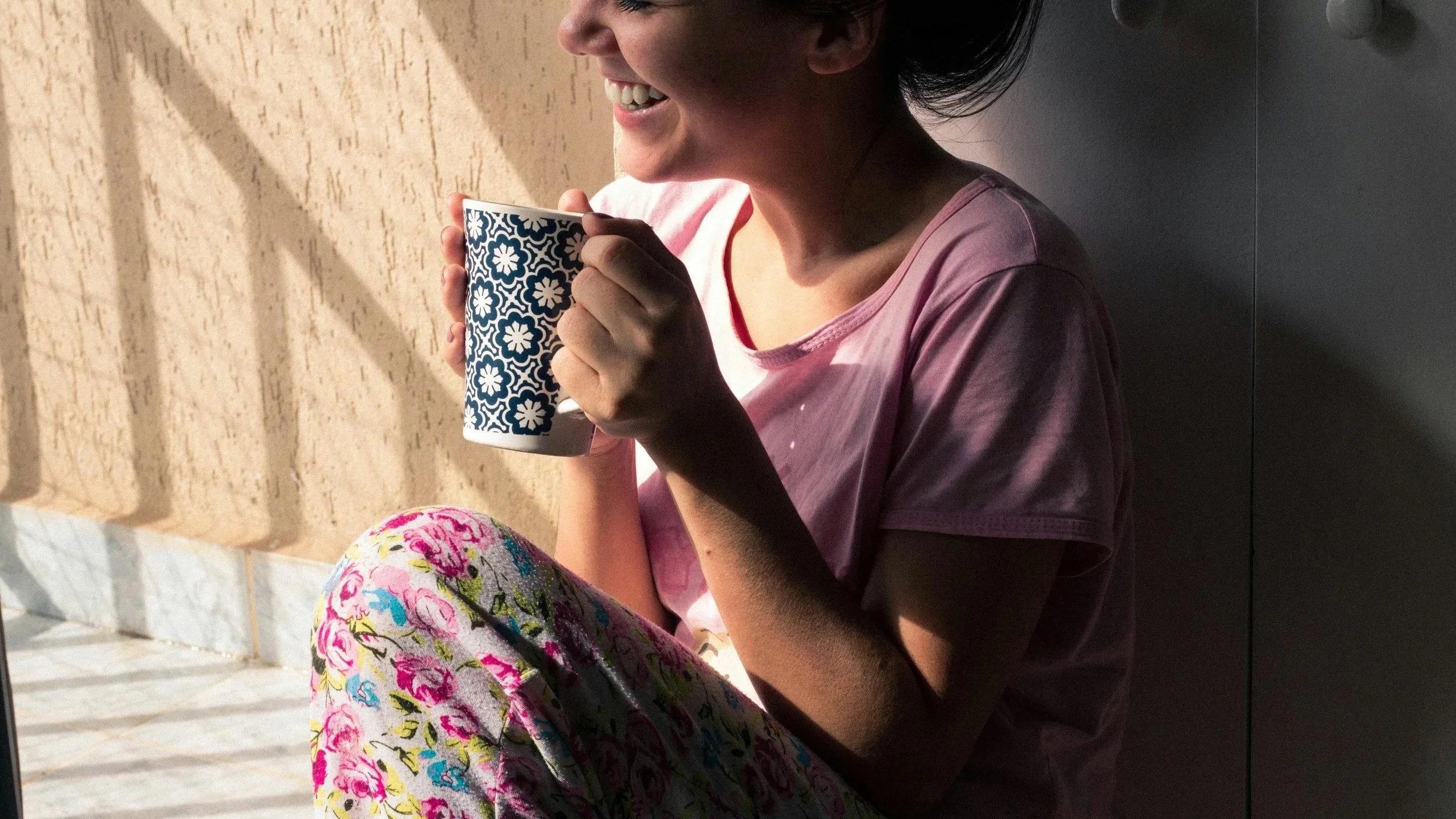These Simple Everyday Exercises from Positive Psychology Improve Sleep and Health
Better sleep after two weeks: even simple positive psychology exercises show quick results. Photo: Katrina Wright (Unsplash)
Just a few daily notes can lead to better sleep after only two weeks. That may not sound particularly realistic at first, but it has been scientifically proven. It involves gratitude exercises, an area of positive psychology. This field has been researched more and more in recent years.
A new review in the American Journal of Lifestyle Medicine has now examined 74 recent studies on positive psychology. The author concludes that even simple everyday rituals can have a lasting positive effect on mental and physical health. These are mostly short exercises that are part of programs lasting several weeks. Below is an overview of the approaches examined:
Gratitude exercises
A proven daily ritual is to keep a gratitude journal in which you write down three positive experiences, events, or thoughts every day. A simple notebook or note-taking app is all you need. Exercises via app also work, but are less effective.
The effect of the ritual is easy to explain: thinking about bright spots every day draws your attention to the good side of life. If you often brood and worry, this interrupts those negative spirals. The brain is trained to focus on the good things. Studies have shown that this improves mood and sleep quality, especially when done before bedtime. Participants fell asleep faster and reported fewer intrusive worries.
The key is regularity: One-off or sporadic practice showed hardly any measurable effects in studies. But after two weeks of daily journaling, first improvements were already evident. In the long term, the brain will automatically find rays of hope even in difficult situations.
Self-compassion
A more complex but equally effective approach is self-compassion. The exercises focus on treating yourself with kindness, appreciation, and understanding. he best-studied program here is Mindful Self-Compassion (MSC), an eight-week training developed by Kristin Neff and Christopher Germer. The training, which usually lasts eight weeks, includes guided meditations, breathing exercises, and writing compassionate letters to oneself.
In these letters, participants write to themselves from the perspective of a supportive friend, helping to reframe self-critical thoughts. MSC also uses short mantras, such as: “This is a moment of suffering. Suffering is part of being human. May I be kind to myself in this moment.” Repeated daily, such phrases become accessible in stressful situations.
Research shows that MSC reduces self-criticism, stress, and anxiety, while increasing resilience, empathy, and positive behaviors.
Meaning-Oriented Interventions
“How do I feel about this world?”, “How do I live my values?”, “Why do I always get annoyed with other people?” Purpose-oriented exercises dig deep and tackle specific issues. This usually takes place with therapists or coaches over several weeks. As with gratitude, it can also be done through journaling tasks, similar to keeping a diary.
Participants reflect several times per week on questions such as: “What gives my life meaning?”, “Which values matter most to me, and how do I live them?”, or “What legacy do I want to leave?” Some studies combined journaling with coaching or therapy sessions over several weeks.
The effects are notable: greater resilience, emotional stability, and stronger motivation to maintain healthy routines in areas such as exercise, nutrition, and sleep. Participants were also more likely to reduce risky behaviors such as smoking or excessive drinking.
Meaning interventions are particularly helpful for people with chronic illness or burnout risk, as well as older adults seeking renewed life satisfaction. It helps them to prioritize correctly, set their course, or develop a positive attitude to life despite health restrictions. However, not everyone finds such deep reflection accessible, and cultural context matters: what works in Western settings may resonate less in Asia.
Strengths-Based Interventions
Another well-researched approach is character strengths interventions, often based on the Values in Action Inventory of Strengths (VIA-IS). Participants identify their top five “signature strengths” (e.g. curiosity, kindness, perseverance) and then practice using them in new ways.
For example, someone high in curiosity might deliberately take a new route to work or start conversations with strangers. Keeping a strengths diary helps track progress. Coaching or group programs further enhance the effect by shifting focus from deficits to resources.
Studies show that actively applying strengths – not just identifying them – leads to greater well-being, self-efficacy, and stress management.
Positive Future Visualization
Looking ahead optimistically is another proven intervention. The best-known exercise is the Best Possible Self (BPS). Participants write or speak several times per week about their optimal future life – including personal, professional, and health aspects.
Some studies also tested vision boards, where goals are visualized once and then reviewed daily. Both formats increased optimism, confidence, and motivation, and helped establish healthier routines. Vision boards are popular but have not yet been researched extensively.
Future visualization is especially effective during life transitions such as retirement, career change, or after graduation, when people are seeking clarity about identity and goals.
Acts of Kindness
This shifts the focus away from oneself and onto others. Participants perform deliberate acts of kindness. In some studies, they carried out several small kind acts in a single day (e.g. compliments, helping, small favors). In others, they performed one kind act per day over a week.
The kindness exercises lead to more positive emotions and stronger social cohesion. In addition, self-esteem increases as you experience yourself as effective, useful, and helpful. In the short term, a day with several good deeds is ideal for lifting your mood. In the long term, however, daily acts of kindness are necessary to achieve lasting results.
Good deeds should be voluntary and individual. Authenticity is crucial. Forced acts of kindness have little effect.
Cultural Differences: Focus in Asia
Most studies come from Western contexts. Research in China and other Asian countries shows that Positive Psychology also works there – but with different emphases. Programs focusing on family, community, and values are more effective than purely individual approaches.
In Chinese Positive Psychology, Yin-Yang thinking is integrated: joy and suffering are seen as complementary, and the goal is balance and harmony rather than constant optimization. Meaning-oriented interventions are particularly powerful, but they emphasize connectedness, relationships, and social roles rather than individual self-actualization.
Limitations
An exercise a day keeps the positive effects at bay: the simple training exercises only work if participants stick with them and follow the program for weeks and months. Every day. Even during vacations. Even after tough days. Irregular exercises showed little effect in the studies. In addition, sustainability has not yet been well researched, i.e., how long the effects last if you stop training.
The review highlights that Positive Psychology interventions can reduce stress, rumination, and self-doubt, while increasing confidence, motivation, and healthy behaviors. However, due to the diverse approaches, different content, and program durations, these are only comparable to a limited extent. Unlike standardized programs such as MBSR (Mindfulness-Based Stress Reduction), Positive Psychology lacks a single gold standard.
Recommendations for Getting Started
Despite the limitations, there is a clear recommendation. It is better to do one exercise properly than five half-heartedly. Gratitude and kindness are the easiest. Starting with a single exercise from positive psychology is more promising than getting bogged down in a mix. And structured guidance, for example through courses or coaching, significantly increases the success rate.
Apps are available for many of these exercises. These are also effective. However, the review study clearly emphasizes that guided programs with therapists or coaches are superior to the independent use of an app.
Daily exercises that can be completed in a short amount of time and in everyday situations are particularly effective. At the same time, however, it is also worthwhile to not only go through the exercises in your head, but also to write down your insights for yourself. According to the studies, those who take 5 to 15 minutes a day and complete a program for at least eight weeks will benefit from the positive results.
The best time to start is today. Right now. With gratitude. It only takes two minutes to note down three positive moments of the day. Don't overthink it, they can be small things: a nice conversation, a child's cheerful laughter, a good meal, good news, a ray of sunshine after the rain, or a privilege of modern life, such as a warm shower. Repeat the next day and you've created a daily ritual.
Sources
American Journal of Lifestyle Medicine: Positive Psychology and Health Behavior Change in Lifestyle Medicine: A Narrative Review
American Psychologist: Positive Psychology Progress
Frontiers in Psychology: Positive Psychology and Gratitude Interventions: A Randomized Clinical Trial
Journal of Personality and Social Psychology: Counting blessings versus burdens: An experimental investigation of gratitude and subjective well-being in daily life
Center for Mindful Self-Compassion (Kristin Neff): The Mindful Self-Compassion (MSC) Program
Clinical Psychology Review: How do mindfulness-based cognitive therapy and mindfulness-based stress reduction improve mental health and wellbeing?
Frontiers in Psychology: The relationships of character strengths with coping, work-related stress, and job satisfaction
Personality and Social Psychology Bulletin: The health benefits of writing about life goals
The Journal of Positive Psychology: Manipulating optimism: Can imagining a best possible self be used to increase positive future expectancies?
BMC Public Health: Positive psychology interventions: A meta-analysis of randomized controlled studies
School Psychology: Cultural adaptation and evaluation of a school-based positive psychology intervention among Chinese middle school students
Get your weekly dose of good news every Wednesday morning. We'll send you all the new Happy Spot articles with quick summaries, along with the week's top headlines featuring good news worth reading.
TRENDING ARTICLES










